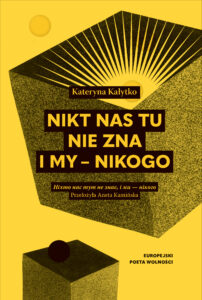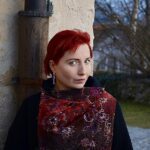Kateryna Kałytko
Ukraine

Kateryna Kałytko, Ukraine. Aneta Kamińska
Kateryna Kałytko
Although love and war are opposing elements, the former likes to nest in the latter’s shadow. In times of war, peace exists only inside a room, where two lovers arm themselves with patience, passion and affection, choosing to create a new life, acting contrary to the logic of fear. They live inside a trap for so long that they start to regard it as a scourge. The enemy stopped being real but still helps them remember what freedom is and how much it is worth. And inner freedom is decidedly more important than one that becomes trite and boring. In these poems, freedom incubates inside words whispered to a loved one’s ear or arranged into a song.
A selection of poems
Kateryna Kałytko

Kateryna Kalytko (born 1982) is a poet, prose writer and translator born in Vinnytsia, Ukraine. She studied political science and journalism at the National University of Kyiv-Mohyla Academy. She is the author of several books of poetry: Posibnyk zi stvorennia switu (1999), Syokhodnishne zavtrashne (2001), Portretuvannia asfaltu (2004), Dialokhy z Odisseyem (2005), Sezon shtormiv (2013), Kativnia. Vynokhradnyk. Dim (2014), Bunar (2018), Nikhto nas tut ne znaye, y my – nikokho (2019), and prose books: M.isteriya (2007) i Zemla Zakhublenykh, abo Malenki strashni kazky (2017). She has won several literary awards, including Slovenian Vilenica Crystal award (2016), Joseph Conrad award (2017), BBC Book of the Year award (2017), LitAkcent of the Year award (2014, 2018, 2019), UNESCO City of Literature award (2019), and Women in Arts and UN Women award (2019). Kalytko translates and promotes modern literature of Bosnia and Herzegovina. She published translated works of Miljenko Jergović, Emir Kusturica, Nenad Veličković, Mileta Prodanović, Uglješa Šajtinac, Ozren Kebo, and Meša Selimović. She received the “Kryvbas Courier” magazine award and METAPHORA prize for her translations. She is member of the Ukrainian PEN Club. In Poland, her poems – translated by Aneta Kamińska – were published in anthologies: 30 wierszy zza granicy. Młoda poezja ukraińska [“30 Letters from Abroad. Young Ukrainian Poetry”] (2012), Wschód – Zachód. Wiersze z Ukrainy i dla Ukrainy [“East-West. Poems from, and for Ukraine”] (2014), and Listy z Ukrainy. Antologia poezji [“Letters from Ukraine. Anthology of Poetry”] (2016).
Aneta Kamińska
Aneta Kamińska (born 1976) is a poet and translator of Ukrainian poetry. She was born in Szczebrzeszyn, grew up in Zamość, but lives in Warsaw. She graduated from the University of Warsaw with a degree in Polish philology. She works as an educator and teacher of Polish to foreigners. She is the author of books of poetry: Wiersze zdyszane (2000), zapisz zmiany (2004), czary i mary (hipertekst) (2007), autoportret z martwą naturą, ostatnie wiersze nazara honczara napisane przez anetę kamińską (2018, 2019 Nike Award nominee), and więzy krwi (2018). She published translated poems of: Nazar Honchar Gdybym (2007; with Andriy Porytka), Halyna Tkaczuk Ja ta inszi krasuni / Ja i inne piękności (2011), Chrystia Wenkhryniuk Dowhi oczi / Długie oczy (2013), Borys Humeniuk Wiersze z wojny (2016), Lubow Jakymczuk Morele Donbasu (2018), Julia Stakhivska Wszystkie możliwe rzeczy (2019; Literatura na Świecie” Award for translation), Wasyl Holoborodka Tęcza na murze (2020), as well as poetic prose of Olaf Clemensen Lato ATO (2020), and 3 anthologies: Cząstki pomarańczy. Nowa poezja ukraińska (2011), 30 wierszy zza granicy. Młoda poezja ukraińska (2012), and Wschód – Zachód. Wiersze z Ukrainy i dla Ukrainy (2014). She is a co-translator of anthologies: Portret kobiecy w odwróconej perspektywie. 12 poetek z Czech, Słowenii i Ukrainy (2013), Komiks wierszem po ukraińsku (2015), and Listy z Ukrainy (2016). She is the co-creator of Wspólny Pokój (Shared Room) – a seminar dedicated to literary works of women. She frequently works with Babiniec Literacki, where she publishes translated poems of Ukrainian female poets. She is a member of the Polish Literary Translators Association and the Ukrainian PEN Club. She received a scholarship from the Ministry of Culture and National Heritage twice (for compiling anthologies of Ukrainian poetry).

